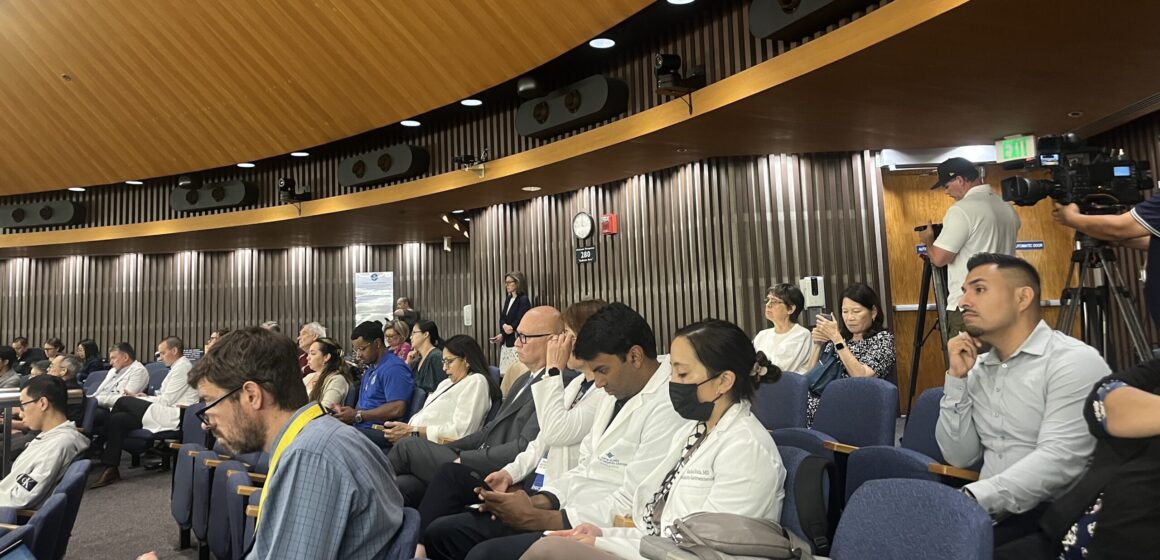Santa Clara County voters will be asked to approve a five-eighths cent sales tax increase to protect the public hospital system from shattering under federal spending cuts.
The Board of Supervisors on Thursday voted unanimously to add the proposed tax to the Nov. 4 special election ballot, which will also ask voters to decide on a replacement for former county Assessor Larry Stone. The decision comes just one day before the deadline to submit ballot measures to county election officials. County leaders said they will explore creating an oversight committee to hold spending of the tax dollars to account.
“Whether it’s on a monthly basis or quarterly — it would be great to hear (updates) on a continuous basis so we can make sure we continue to build confidence in our community,” District 1 Supervisor Sylvia Arenas said.
The draft proposal shows the tax would end April 1, 2031. County leaders estimate it will bring in roughly $330 million annually. But it won’t be enough to cover $1.4 billion in losses in Northern California’s largest public hospital system by 2030. The county is preparing for sweeping cuts to federal social safety net programs after the passage President Donald Trump’s “big beautiful bill.”
County Executive James Williams said it wasn’t easy to make this ask of voters.
“The magnitude here is extraordinary and it’s going to call upon this county organization to do extraordinary things, which we’ve done before in the past but cannot do alone,” Williams said at the meeting.
Williams vowed the onus won’t fall solely on taxpayers. He said further county spending cuts will need to happen to ensure the organization is doing its part to preserve its most critical services needed in community.
“There is no way around that reality,” Williams said.
The county is proposing a general sales tax, which requires a simple majority — more than 50% voter approval — to pass. Officials also weighed a special sales tax, which would restrict the spending of that money, better protecting hospital funds from a supervisor majority with different political priorities. But it’s more difficult to pass since it requires a higher threshold of two-thirds voter approval, on top of the short runway to convince voters ahead of November.
District 4 Supervisor Susan Ellenberg said the county doesn’t have time to sit around. The tax increase would take effect April 1, 2026 if approved — by which point the county will have already lost some revenue.
“We have the unique and weighty opportunity today to ask voters to determine how we are going to serve our community and meet their needs over the next several years,” she said. “We cannot afford to sit back and tell ourselves it won’t be that bad, because believe me — it will.”
The county’s losses will mostly come from federal cuts to Medicaid, the public health insurance program known as Medi-Cal in California. It is the largest federal revenue source for the county health system of four hospitals and 15 health clinics. But the county will also take blows from cuts to federal food assistance funding.
Santa Clara County runs two of the region’s three trauma centers and the only regional burn center of its kind in the Bay Area. The county hospitals are Silicon Valley’s largest and most accessible health care provider and the only option for working-class, uninsured patients. One in four of the county’s nearly 2 million residents are Medi-Cal enrollees. Half of the county hospital system’s patients pay through Medi-Cal. The rest pay through a mix of other means and Medicare, a separate federal program serving patients 65 and older and patients of all ages with certain disabilities.
Community health and patient advocates welcomed the move. At the meeting, speakers took the podium to warn that public hospital cuts won’t just hurt the uninsured, as people who lose health coverage shift to emergency departments. County leaders have warned this cascading effect will drive up wait times for largely compensated care and force health care providers to raise prices for people with private commercial insurance.
Dan Nelson, chair of Valley Medical Center’s Emergency Medicine Department, said his doctors already have more patients than resources.
“On average, at VMC, we operate over 207% of our emergency department capacity,” Nelson said, adding it surges at times to more than 500%. “The reality is we’re operating beyond what the current system can sustain.”
Nelson said the federal cuts threaten to push an already-strained system into “outright crisis.”
Taxpayer advocates have vowed to campaign against the measure, arguing the sales tax will be regressive and hurt working-class county residents the hardest. The new ballot question comes at a confluence of tax dramas in Silicon Valley this year. The Silicon Valley Taxpayers Association sued Campbell earlier this year over a half-cent sales tax approved by 72 % of voters. Meanwhile, the exploration of a separate sales tax measure to fund public transit had VTA leaders in disarray in May.
Former Saratoga Mayor Stan Bogosian decried the timing of the meeting — and the notice to residents.
“I’m just incredulous that this meeting today is being held in middle of afternoon when most people are at work or in meetings, and I would like to ask that if you’re talking about something as important as a tax revenue measure, this be offered at a time when folks can actually participate,” Bogosian said.
 District 2 Supervisor Betty Duong said the situation has profoundly impacted the county’s trajectory for generations.
District 2 Supervisor Betty Duong said the situation has profoundly impacted the county’s trajectory for generations.
“We will have to wean our business off federal funds so that our values are never held hostage ever again,” she said.
Contact Brandon Pho at [email protected] or @brandonphooo on X.



Leave a Reply
You must be logged in to post a comment.